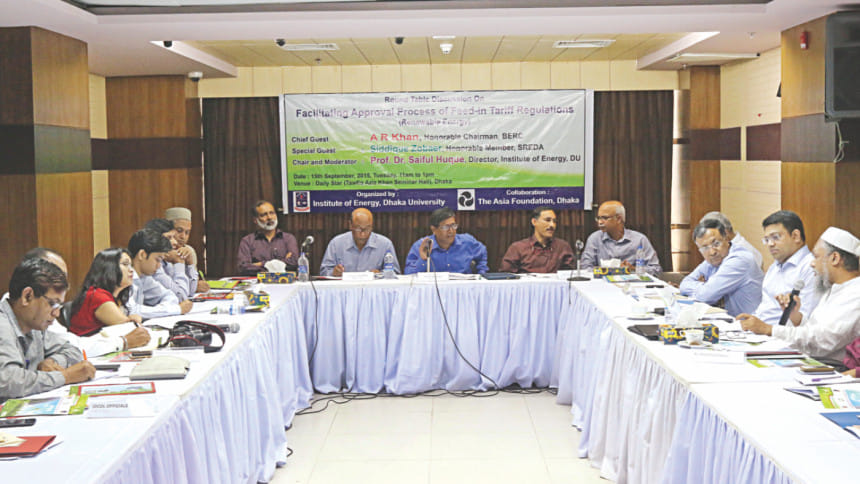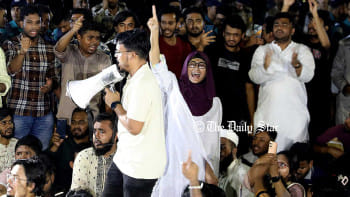Time for feed-in tariff to boost renewable energy

Bangladesh should come up with feed-in tariff as soon as possible to send a positive signal to investors and boost the renewable energy sector, experts said yesterday.
“Our renewable energy sector would have leapfrogged if we had a feed-in tariff scheme in place,” said Prof M Tamim, an energy expert. “It would also have been encouraging for the investors.”
Under a feed-in tariff, renewable electricity generators are paid a cost-based price for the renewable electricity they supply to the grid. This enables diverse technologies (wind, solar, biogas) to be developed and provides investors a reasonable return.
Advancements in renewable energy would be difficult without a feed-in tariff scheme in place, he said. “Big plants will not be set up if they can't operate commercially.”
Tamim, the head of petroleum and mineral resources engineering at Bangladesh University of Engineering and Technology, said there has to be an obligation for power utilities to buy power from renewable energy producers.
To start off, Bangladesh Energy Regulatory Commission (BERC) might make it mandatory for power companies to buy at least 1 percent of their electricity from the renewable energy producers, said Tamim.
Siddique Zobair, a member of Sustainable and Renewable Energy Development Authority, also agreed that the regulator should ask the utilities to buy electricity from renewable energy producers.
They spoke at a seminar on feed-in tariff regulations, organised by the Institute of Energy of Dhaka University in collaboration with the Asia Foundation Dhaka at The Daily Star Centre in Dhaka.
Feed-in tariff gives a guarantee to renewable energy producers that the electricity tariff they would receive would be higher than market rates, providing price certainty and long-term contracts that help finance projects.
About 80 countries have introduced feed-in tariff as of 2014, according to Zobair.
The government plans to generate at least 10 percent of the required power from renewable energy by 2020. It now produces 165MW of power from renewable energy sources, which is about 2.2 percent of total electricity produced in Bangladesh.
Taifur Ahmed Chowdhury, head of the electrical and electronic engineering department of BUET, said the approval procedure has to be simple so that people can come and enjoy the facility.
Ijaz Hossain, a professor at the chemical engineering department of BUET, said Bangladesh's energy sector is in a terrible situation as the country is producing electricity using imported oil, gas reserves are depleting and there is no headway on whether local coal would be used.
Bangladesh would have to go for renewable energy because if a country depends on external trade for 15 percent of its energy, its energy security comes under threat, he added.
After Bangladesh ruled out the possibility of using domestic coal in the near future, the country would rely on foreign sources for 92 percent of its electricity in 2030, said Tamim.
“It is a scary situation for energy security of any country.”
Hasin Jahan, country director of Practical Action Bangladesh, said Bangladesh is not being able to use solar energy at expected levels, although about 40 percent of the population does not have access to the grid power.
“We also need to think about how we bring electricity to the hard-to-reach areas as grid connections can't be taken to many of these areas.”
Incentives have to be given to the renewable energy producers, as they will come up with long-term investments, she added.
Emdadul Haq, a former chairman of BERC, said the feed-in tariff issue is being discussed for a long time now, but nothing has been finalised. “We have to introduce it as soon as possible. We are already lagging behind.” The regulator should form a fund where 1 percent of the tariff would be deposited, which will be used to promote the renewable energy sector, he added.
Prof Shamsul Alam, energy adviser to Consumers Association of Bangladesh, said a provision has to be affixed in the feed-in tariff regulations, outlining that if a licence fails to begin commercial production of renewable energy in the stipulated time, the permit will be cancelled.
Munawar Misbah Moin, managing director of Rahimafrooz Renewable Energy, said the government has to come up with regulations that will help it attain goals and encourage the private sector to invest. “The regulations need to be simple, clear and transparent.”
Saiful Huque, director of Institute of Energy of Dhaka University, said the feed-in tariff scheme will be important for Bangladesh. Asma Huque, chairperson of Purobi Green Energy Ltd, which set up the country's first mini solar grid in 2010, said the tariff must be guaranteed.
AR Khan, chairman of BERC, said the regulator would try to come up with a tariff that is business-friendly.

 For all latest news, follow The Daily Star's Google News channel.
For all latest news, follow The Daily Star's Google News channel. 



Comments